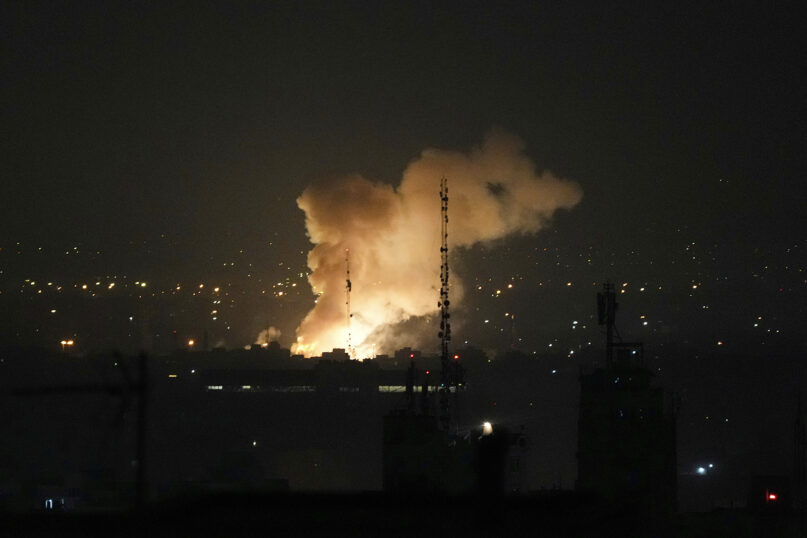(RNS — On Sunday (June 22), the morning after U.S. pilots bombed Iran’s nuclear facilities, I received the following from my old friend Guy Stroumsa, Martin Buber Professor Emeritus of Comparative Religion at the Hebrew University of Jerusalem and Professor Emeritus of the Study of the Abrahamic Religions in Oxford University.
Enough people fill the ether with their thoughts without my help. No reason to ask someone who knows (just a little) about false prophecy in the ancient world. But I may jot down a few immediate thoughts:
1. Israel is a much safer place today than it was two years ago.
2. my rule of thumb is: how would I have reacted at Munich, 1938?
3. deeply flawed people can sometimes do the right thing.
4. The Brits booted Churchill in 1945. Let’s not despair.
5. Hard to trust the right, hard to trust the left. Also hard to trust God.
Bless you,
Guy
p.s. we just went to the grocery store. Very quiet. No gloating. Iran vowed to erase us from the map (and I believe they meant it). We never reciprocated. Nor do I sense any vicious feelings towards the Iranian people.
Just to be clear, this is a voice of committed Israeli liberalism. Guy and his wife, Sarah, a former rector of the Hebrew University, support a two-state solution. Every Saturday evening, they religiously march against the Netanyahu government.
Professionally, they have dedicated their lives to studying the intersections of Judaism, Christianity and Islam. Sarah is a leading expert in Arabic and Judeo-Arabic philosophy, honored throughout the world — including the Muslim world — for her scholarship. Their daughter Rachel headed an NGO providing legal representation to Palestinians imprisoned in Israeli jails.
Are the Stroumsas entitled to support the bombing of Iran’s nuclear facilities? Not, perhaps, according to Pope Leo XIV.
“War does not solve problems, but rather it amplifies them and produces deep wounds in the history of people that take generations to heal,” the pope said Sunday. “No armed victory can compensate for the pain of mothers, the fear of children, the stolen future.”
I have to wonder whether Leo really believes this as a universal truth. Did the American Civil War not solve the problem of slavery or would the U.S. have done better to let the South secede and preserve its “peculiar institution”? Did World War II not solve the problem of Nazism or should the allies have continued along the path set by the 1938 Munich conference and let the Germans have their way with Europe?

Smoke rises up after an explosion in Tehran, Iran, Friday, June 13, 2025. (AP Photo/Vahid Salemi)
For that matter, should the Ukrainians have laid down their arms and let Vladimir Putin’s army take over their country?
Leo seems to be following in the footsteps of his predecessor, Pope Francis, in rejecting the traditional Catholic view that there is such a thing as a “just war” — a concept that, in Christian thought, originates with Leo’s spiritual north star, St. Augustine. The wise man, the latter writes in his “City of God,” “will regret the necessity of participating in just wars.”
Scholastic that he was, Thomas Aquinas methodically outlined a set of criteria for determining when a war is just — an approach that tends in the direction of making some wars morally pure. His claim, among other things, is that an offensive war can be just and that avoiding war is not a reason for tolerating injustice.
The Greek church fathers took a different tack. Recognizing that, in a fallen world, warfare is sometimes warranted, they nevertheless held to the early Christian position that killing is always bad and recommended that soldiers who kill even in a warranted war avoid taking Communion for three years.
Whether the bombing of Iran’s nuclear facilities by the Israelis and the Americans was necessary or at least sufficiently warranted is a question that is impossible to resolve now. We will doubtless be debating it for a long time. In doing so, we should take seriously the Israelis’ deeply held and empirically sound claim that the Iranian regime’s longstanding pledge to wipe Israel off the map was not mere rhetoric.
Wherever we come down, it’s also worth bearing in mind that, as the Greek fathers taught, it is possible to consider a war necessary and at the same time repent for engaging in it.







